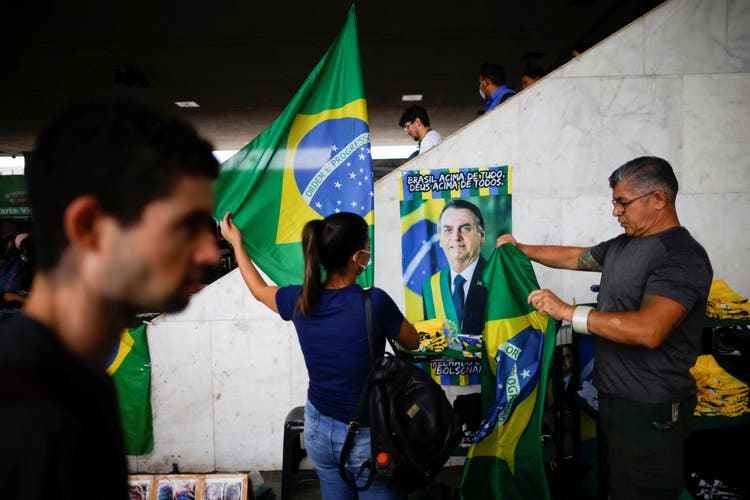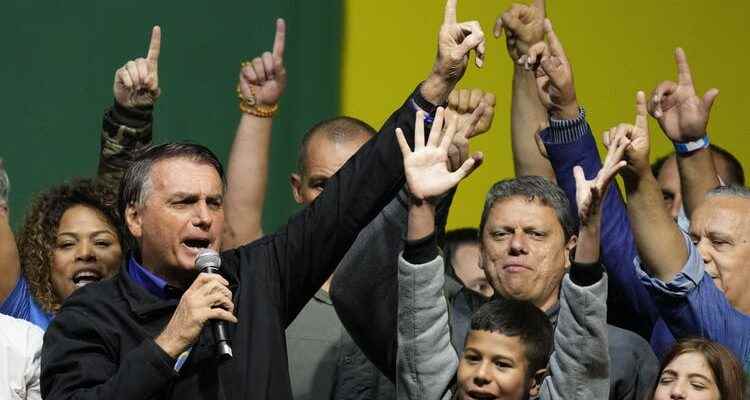The largest country in Latin America is voting this Sunday. President Jair Bolsonaro sows doubts about the electronic voting system. His followers are armed. Violent unrest is imminent. The polls close at midnight Central European Time.
President Jair Bolsonaro with supporters at an election rally in Santos.
He will accept the election results – as long as everything goes right in the elections, President Jair Bolsonaro repeats to his supporters almost every day. Anything other than a high election victory in the first ballot this Sunday indicates that something is wrong in the Supreme Electoral Court.
With the bold claim of election victory, the president seems to want to prepare his supporters for the impending defeat in his re-election. Because things are not looking good for him: In the polls by the renowned institutes Ipec and Datafolha, his opponent Luiz Inácio Lula da Silva is 14 percentage points ahead of him. An election victory for ex-president Lula in the first ballot seems possible.
In order to discredit a possible defeat in advance, Bolsonaro attacks the electronic ballot box. He has been doing this since the beginning of his government in 2019. He has never been able to present any evidence to support his claims. He himself was elected six times with this system as a deputy for Rio de Janeiro and finally president.
The electronic urns have reduced the manipulations
The electronic voting system has been working without any problems for more than two decades. It was first used in 1996. Elections in Brazil have been entirely electronic since 2000. This prevented the previously usual manipulation of the ballot boxes. In addition, the number of invalid votes could be reduced because voters who cannot read or write were often overwhelmed before. In the elections like this coming Sunday, they still have to choose MPs, senators and governors at the same time.
In the past, voters had to enter the numbers of their candidates in writing. Now they enter a code, see the photo of the chosen one and confirm the person with a green button. Anyone who wants to abstain or vote invalid (voting is compulsory in Brazil) presses a white button.
The electronic ballot boxes for the 156 million voters are not connected to the internet, as Bolsonaro claims. They work autonomously. The result of the polling station will be printed out and publicly displayed after the end of the vote. The hard drive with the voting results is taken in a sealed envelope to the nearest state electoral court, and the results are transmitted by network or satellite (e.g. in the Amazon) directly to the Supreme Electoral Court in Brasilia.
On Bolsonaro’s instructions, the military persistently sow doubts about the electronic system. Like Bolsonaro, the military wanted to introduce a printout of the vote as evidence. But Congress rejected the request.
Bolsonaro is a supporter of the dictatorship – like his voters
Rightly so, because vote buyers could use the receipt to check whether a voter voted as promised. In addition, a candidate like Bolsonaro could more easily claim in parallel vote counts that there were irregularities in the elections – just like his role model Donald Trump in the USA.
But this danger still exists. The following scenario currently seems conceivable in Brazil: On the day of the election, rumors surfaced on the social networks that things had not been done properly in some constituencies. As a result, armed Bolsonaro supporters took to the streets. There are attacks on Congress, the Supreme Court or the electoral commission. In the general chaos, Bolsonaro then either declares the elections invalid or prevents the transfer of power by declaring a state of emergency.
The question is whether the military would oppose this creeping transformation into an authoritarian regime. Former President Fernando Henrique Cardoso, himself the son of a general, said: “The military is not preparing a coup – but it could be pressured into participating.”

A stand with Bolsonaro campaign material in the central bus station of the capital Brasília.
Would the military join a coup?
Bolsonaro is a supporter of the military dictatorship, like most of his constituents. He also makes no secret of the fact that he would like to eliminate the judiciary or the media. For an attack on the judiciary and Congress, i.e. a classic coup, Bolsonaro needed the support of the state security forces.
The military occupy key positions in his cabinet. Under Bolsonaro, 6,000 members of the army were given posts in the state apparatus. Nevertheless, Bolsonaro’s government is not a military government. At the moment it doesn’t look as if those in uniform want to actively support a putsch.
However, if there were riots and clashes after the elections, the military would probably be on hand to ensure calm. And this is where the danger lies. Because in three and a half years in power, Bolsonaro has created the conditions to be able to start unrest.
Many Bolsonaro supporters are armed today
Many of his middle-class supporters are now armed. Bolsonaro has systematically relaxed gun laws. The number of guns held by the civilian population has doubled to two million under his government.
Bolsonaro has turned some of the federal police units – which are not subordinate to the federal states – into feared elite troops. For example, the heavily armed highway police – Polícia Rodoviária Federal – intervened like bodyguards on the orders of the President.
He enjoys great sympathy from the private security forces, who number about twice as many as the police force. Bolsonaro is also closely associated with the violent militias. In Rio de Janeiro, however, they are also increasingly dominating the periphery of the metropolises. They live off the drug trade and protection money.
It could be easy for Bolsonaro to arouse this potential for violence – similar to what Trump did in the United States. In Brazil, the willingness to take up arms is far greater than in the USA.
Political violence has increased sharply
For this reason, the Supreme Court is currently considering whether the numerous newly founded shooting clubs in the country should remain closed on election day. He has already banned the carrying of weapons around polling stations.
Political violence has increased sharply under Bolsonaro, who himself was the victim of a knife attack that nearly killed him during the 2018 election campaign. Bolsonaro supporters are increasingly attacking opposition politicians or journalists, sometimes fatally. 45 politicians were murdered in the first half of 2022. In a poll, just two-thirds of the population said they were afraid of political violence.
So far, Brazil’s democratic institutions are proving surprisingly strong. There is also no major alliance in society today that would support the intervention of the armed forces, as was the case with the last coup in Brazil in 1964.
The majority of Brazilians reject Bolsonaro’s authoritarian demands. But even if he clearly loses and then does not start an uprising, it is likely that he will continue to rally his supporters behind him on the issue of electoral fraud – and could make it difficult for any president to govern. Just like its model in the USA.
